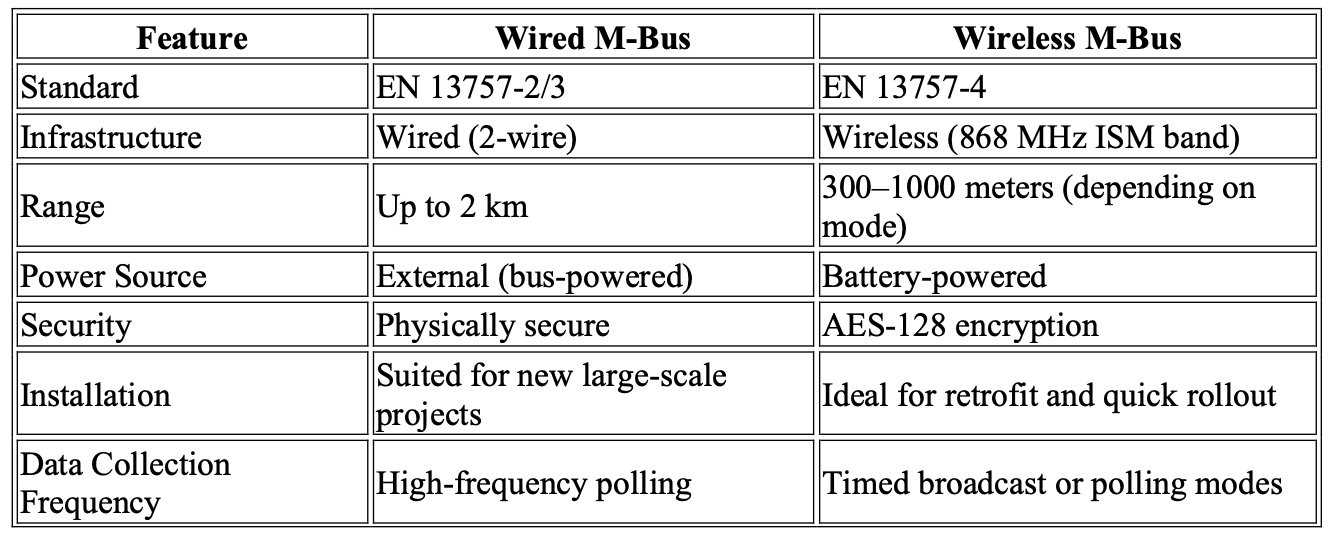
These technologies are ideal for smart buildings and city-wide utility networks, enabling real- time data collection, automated billing, and precise consumption monitoring.
Wired M-Bus – Precision Data for Complex Installations
Overview
Wired M-Bus follows the EN 13757-2/3 standards and uses a simple two-wire bus for reliable and long-distance communication between meters and central data systems. It is ideal for multi- unit buildings and fixed installations where signal reliability and security are essential.
Key Features
➢ Universal Meter Compatibility – Supports electricity, water, gas, and thermal meters.
➢ Frequent Data Collection – Enables high-resolution readings at short intervals.
➢ Validated Billing Data – Ensures secure, tamper-proof consumption records for
invoicing.
➢ Live Data Transmission – Sends real-time data to central systems via a stable wired
connection.
➢ Advanced Energy Monitoring – Visualizes consumption patterns for insights and
optimizations.
➢ EED-Compliant – Supports informative billing in line with the EU Energy Efficiency
Directive.
Benefits
✓ Highly stable and immune to electromagnetic interference.
✓ Suitable for environments with dense infrastructure or restricted wireless access.
✓ Long cable lengths (up to 2 km) without signal repeaters.
Wireless M-Bus – Secure, Flexible, and On-the-Move
Overview
Wireless M-Bus (EN 13757-4) is designed for remote, low-power meter reading using wireless radio frequencies (typically 868 MHz). It enables utilities to collect meter data using walk-by, drive-by, or fixed network methods without requiring direct physical access.
Key Features
➢ Mobile Data Collection – Enables reading via handhelds or mobile units.
➢ No In-Person Access Required – Perfect for hard-to-reach or secured locations.
➢ AES-128 Encrypted Communication – Ensures secure data transmission.
➢ Ideal for Water, Heating, and Cooling Meters – Especially effective for thermal
energy networks.
➢ Battery-Friendly – Designed for ultra-low energy consumption and long operational life.
Benefits
✓ Reduces operational costs by eliminating the need for site visits.
✓ Quick and cost-effective deployment in both new and retrofit projects.
✓ Compatible with OMS (Open Metering System) for multi-vendor interoperability.
Wired vs Wireless M-Bus – Quick Comparison


Hybrid Approach: Wireless M-Bus to LPWAN Gateway
For large deployments, Wireless M-Bus data can be forwarded via LoRaWAN or NB-IoT gateways, allowing data from local meters to be transmitted across wide-area networks to central servers. This hybrid architecture blends flexibility with scalability—making it ideal for smart cities.
Why Choose SenseMi?
At SenseMi, we offer certified M-Bus solutions based on European standards (EN 13757 and OMS), including:
❖ Industry-proven wired and wireless modules
❖ AES-128 encryption and secure protocols
❖ Gateway integration for hybrid smart metering networks
❖ Long-term support for smart building and city-wide infrastructure projects
Whether you're upgrading a small residential building or launching a city-scale metering system, our M-Bus technologies offer the flexibility, reliability, and security you need.
Smarter data starts with smarter communication.
Ready to enhance your metering infrastructure with future-proof, standards-compliant technologies?
Get in touch with the SenseMi team today to explore the right M-Bus solution for your project—wired, wireless, or hybrid.








